| |
| |
| |
| Presented By RENEWAL BY ANDERSON |
| |
| Axios World |
| By Dave Lawler · Mar 27, 2023 |
| Welcome back to Axios World. - Tonight's edition (1,819 words, 7 minutes) starts in Israel, with stops in Senegal, Belarus, Lebanon and more.
Heads up: Axios' second annual What's Next Summit is this Wednesday. You'll hear from Sen. Mark Kelly (D-Ariz.), White House science and tech policy director Arati Prabhakar, NASA administrator Bill Nelson and more. Register for the livestream here. |
| |
| |
| 1 big thing: Netanyahu pauses judicial push to avoid "civil war" |
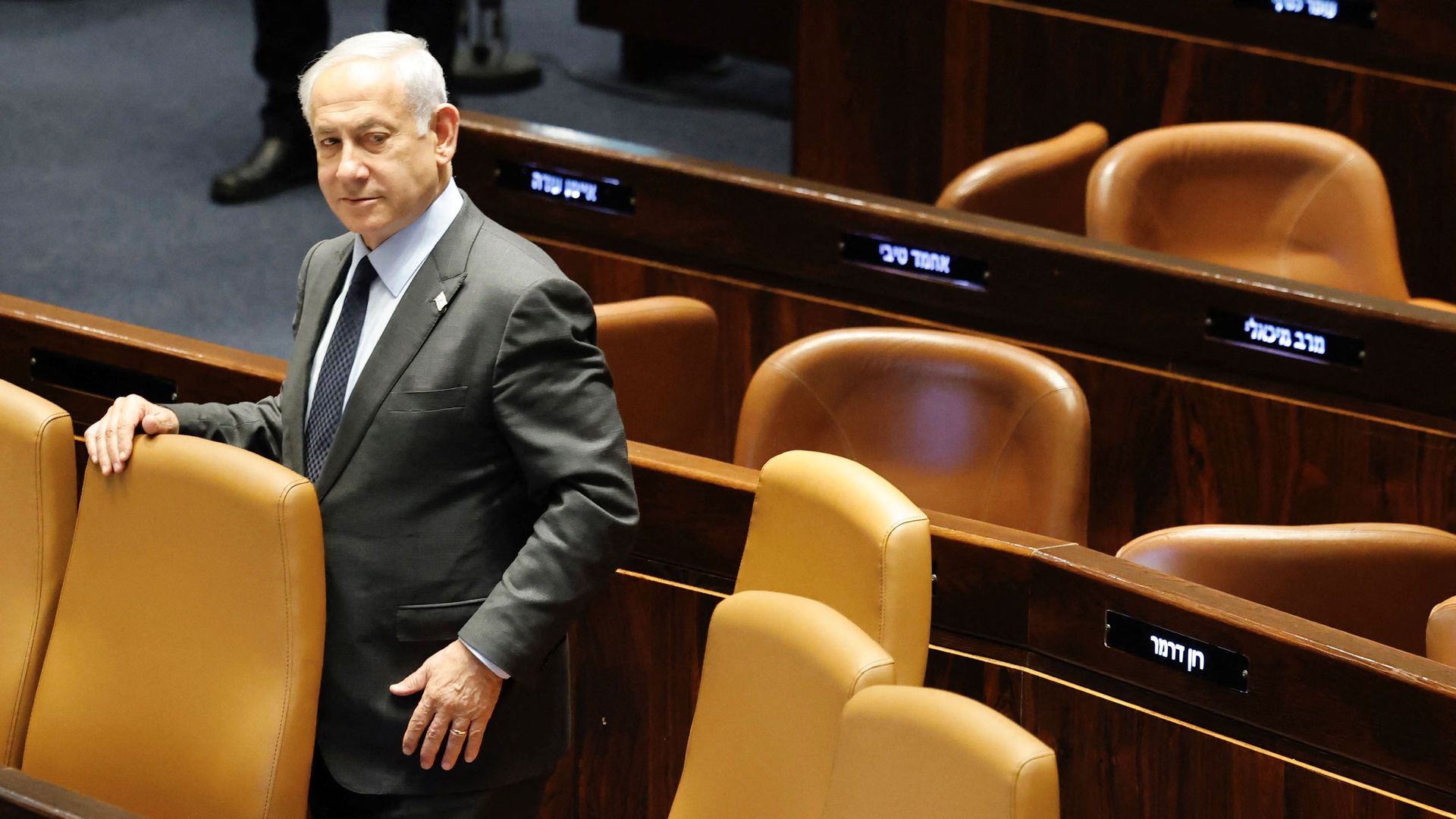 |
|
| Prime Minister Benjamin Netanyahu in the Knesset after announcing the pause. Photo: Marc Israel Sellem/AFP via Getty Images |
| |
| After nearly three months of massive protests, damaging economic uncertainty, dissension in the military, warnings of civil war and most recently a nationwide strike, Israeli Prime Minister Benjamin Netanyahu today suspended legislation to overhaul Israel's judicial system. Driving the news: "When there's an option to avoid civil war through dialogue, I take a time-out for dialogue," Netanyahu said in televised remarks. The climb down came just a day after Netanyahu fired his defense minister for proposing just such a pause, sparking spontaneous demonstrations overnight that saw protesters block highways and temporarily force the closure of Tel Aviv's international airport. - By this morning, the streets remained full of protesters and Israel's largest labor union had called for a strike. Even Israel's embassy in Washington remained closed because diplomats refused to turn up to work.
- Netanyahu's message today was not entirely conciliatory. He accused an "extremist minority" of "trying to tear our country apart," including by refusing to turn up for military service to protest the reforms.
The big picture: The judicial plan would give the government far more control over the judiciary and in particular the Supreme Court, which many of Netanyahu's coalition partners claim is over-powerful, left-leaning and prone to "judicial activism." - Because Israel has a single legislative chamber, in which the government by nature commands a majority, the court is also the only instrumental check on the government's power.
- Thus, the plan to give the government more sway in appointing judges and the ability to overrule court decisions with a simple parliamentary majority delighted many on the right and infuriated many on the left — particularly since Netanyahu himself is currently facing corruption charges. He denies any wrongdoing.
- The debate pitted the largely secular, left-leaning Israelis who comprise the bulk of the elite against the religious conservatives who comprise a growing share of the population and helped bring the most right-wing government in Israel's history to power.
The intensifying crisis posed a clear risk to Israel's international standing and to the legacy of the country's longest-serving prime minister. But Netanyahu also had to consider the stability of a government he fought so hard to form after losing power in 2021. - Netanyahu only paused the legislation today after Justice Minister Yariv Levin and far-right national security minister Itamar Ben-Gvir withdrew threats to resign if he did so.
- Ben-Gvir claimed Netanyahu promised that the coalition would pass the legislation unilaterally if no compromise was reached by the next legislative session.
State of play: Opposition leaders Yair Lapid and Benny Gantz say they're ready to take part in talks, to be overseen by President Isaac Herzog. - Lapid said his goal is to reach an agreement for an Israeli constitution but warned that if Netanyahu tries any "tricks" the protests will resume.
- The U.S. and other Western countries had been urging dialogue and welcomed today's news.
What to watch: It's hard to envision an outcome that would satisfy the protesters, the opposition and Netanyahu's hard-right coalition partners, Axios' Barak Ravid notes. This is a long way from over. |
    |
| |
| |
| 2. Popularity contest: Who's up, who's down |
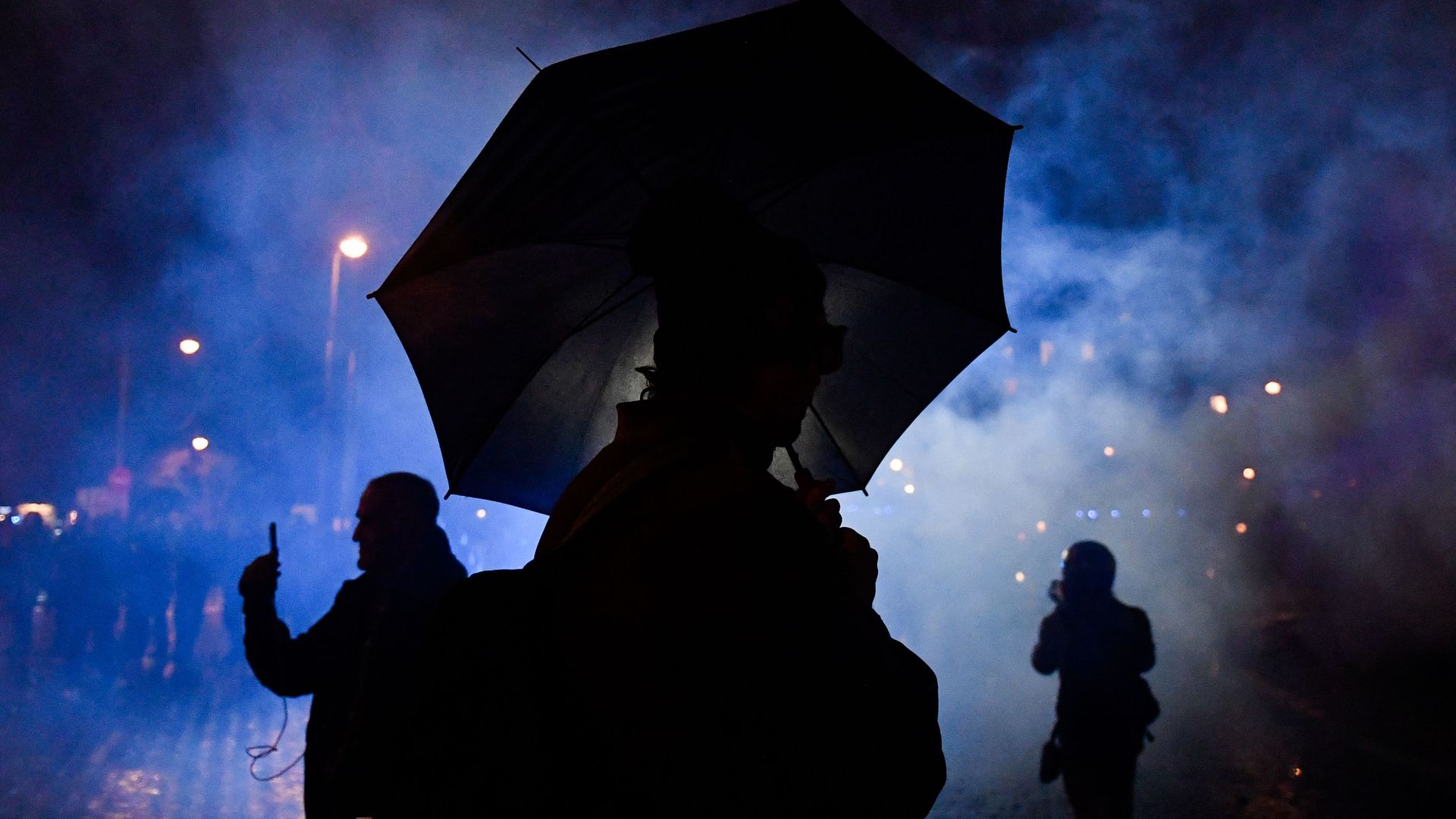 |
|
| A protester uses an umbrella to protect himself from a water cannon last week in Paris. Photo: Julien De Rosa/AFP via Getty Images |
| |
| French President Emmanuel Macron's approval ratings have slumped to 23% as protests over his pension reforms continue to grip the country. Another round of strikes is expected tomorrow. Macron's 23% is tied for last among the 22 leaders in Morning Consult's tracker with South Korean President Yoon Suk-yeol, who has been mired in the low 20s since soon after taking office last year. - Yoon has recently taken the bold but unpopular step of seeking to reconcile with Japan over abuses committed during the Japanese occupation (1910-1945).
- Japanese Prime Minister Fumio Kishida isn't faring much better, at 24%, but other polls show confidence in his government rising following his summit with Yoon and visit to Kyiv.
Middle of the road: Italy's Giorgia Meloni (52%) and Brazil's Luiz Inácio Lula da Silva (49%) are off to decent starts in the polls, while President Biden (41%) Canada's Justin Trudeau (40%), the U.K.'s Rishi Sunak (36%) and Germany's Olaf Scholz (34%) are all under water. Flying high: Indian Prime Minister Narendra Modi is top of the list with 78% approval, a number that has hardly budged for more than a year. - Mexican President Andrès Manuel López Obrador's still-formidable rating (62%) has fallen by 10 points over the past three months. He's faced big protests during that time over his plan to reduce the power and independence of Mexico's electoral institutions.
- Mexico's Supreme Court halted those reforms on Friday in order to hear a legal challenge, leading López Obrador to slam the court as part of a "mafia of power."
- Australian Prime Minister Anthony Albanese (55%) is also near the top of the list. His strong position 10 months into his tenure was underscored by a big regional election victory this weekend.
El Salvador President Nayib Bukele was not included in the Morning Consult survey, but a recent poll put his approval at 90%. - It's been one year since Bukele introduced a state of emergency that allows police to arrest people without charge in order to combat gang violence. Nearly 2% of the population has been locked up.
- While human rights groups have been appalled, some neighborhoods now feel far safer, the Economist reports.
|
    |
| |
| |
| 3. Africa news roundup |
 |
|
| Paul Rusesabagina on a visit to the U.S. in 2005. Photo: Chris Maddaloni/Roll Call/Getty Images |
| |
| 1. Senegal President Macky Sall insists he's eligible to seek a third term next February because his first term was never supposed to count toward constitutional term limits adopted in 2016. - His would-be challenger, Ousmane Sonko, claims Sall is putting the country's stability at risk for his own political ambitions. Sonko's supporters have held protests over charges leveled against him for defamation and rape, which he says are politically motivated.
- "If Senegal was not a genuine democracy, believe me, his fate would have been settled long ago," Sall told L'Express of Sonko.
2. Paul Rusesabagina, whose actions to shield Tutsis during the Rwandan genocide served as the basis for the film "Hotel Rwanda," was released from prison on Saturday. - Rusesabagina became a prominent critic-in-exile of Rwandan President Paul Kagame. His family says he was taken to Rwanda against his will in 2020 and held on terrorism charges.
3. Vice President Kamala Harris is visiting Ghana, Tanzania and Zambia this week. She's the latest in a string of senior U.S. officials to visit Africa, with Biden expected to go later this year. - On the one hand... the administration wants to show it's interested in economic partnerships on the continent, not lectures on human rights.
- On the other... During a press conference today, Harris and Ghana's President Nana Akufo-Addo were asked about an anti-LGBTQ bill being debated in Ghana's parliament. Harris said LGBTQ rights were a personal priority but didn't comment on the legislation.
4. The bodies of at least 29 migrants have been recovered off the coast of Tunisia after three boats capsized while trying to cross the Mediterranean. - Tunisia has become a key departure point for Africans trying to reach Europe by sea.
- Tunisian President Kais Saied gave a conspiracy-tinged speech last month accusing sub-Saharan Africans of bringing crime and demographic changes to Tunisia, sparking roundups and vigilante violence.
- Countries including Ivory Coast and Guinea have repatriated some of their citizens. Others continue to attempt the crossing.
5. Fans of Mozambican rapper Azagaia have vowed to hold additional marches in his honor in the coming days after police violently cracked down on demonstrations last week, per AP. - Azagaia, a prominent critic of the government, died of an epileptic seizure at age 38.
|
    |
| |
| |
| A message from RENEWAL BY ANDERSON |
| Why your electric bill could be so high |
| |
 |
| |
| Windows make up 25% to 30% of residential heating and cooling energy use, the Department of Energy reports. What this means: It might be time to replace your windows. Renewal by Andersen was ranked No. 1 in customer satisfaction 3 years in a row. Get a free quote — and learn how to get 15% off your order. |
| |
| |
| Bonus: Where in the World |
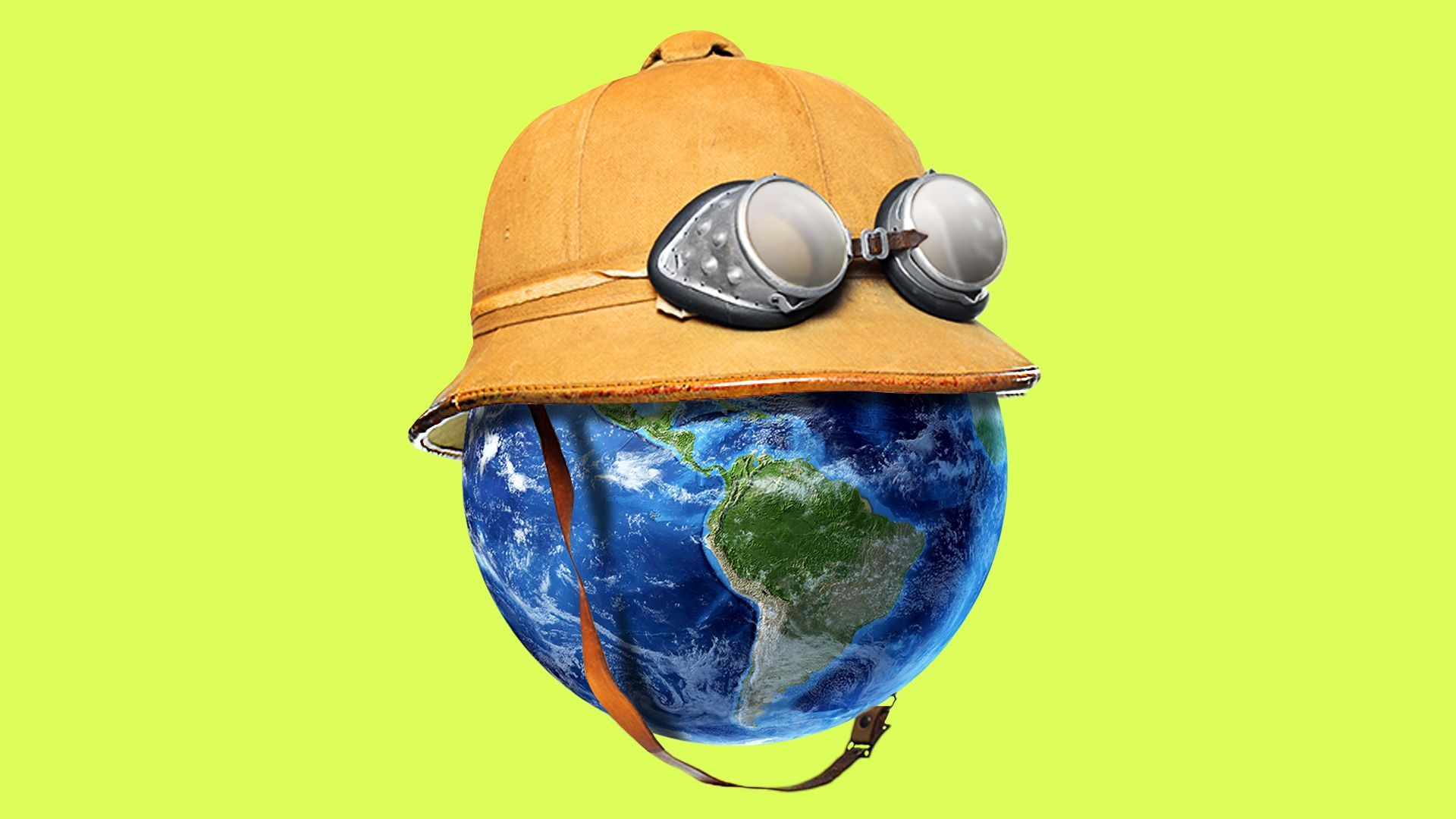 |
|
| Illustration: Natalie Peeples/Axios |
| |
| Today's theme is reinvention. Can you give me the current name of the city that was previously known as, or sits upon the ruins of... - Byzantium
- Bombay
- Leningrad
- Saigon
- Edo
- Peking
- Leopoldville
- York
- Kristiana
- Tenochtitlán
Scroll to the bottom for answers. |
    |
| |
| |
| 4. Putin says Russia will move nukes to Belarus |
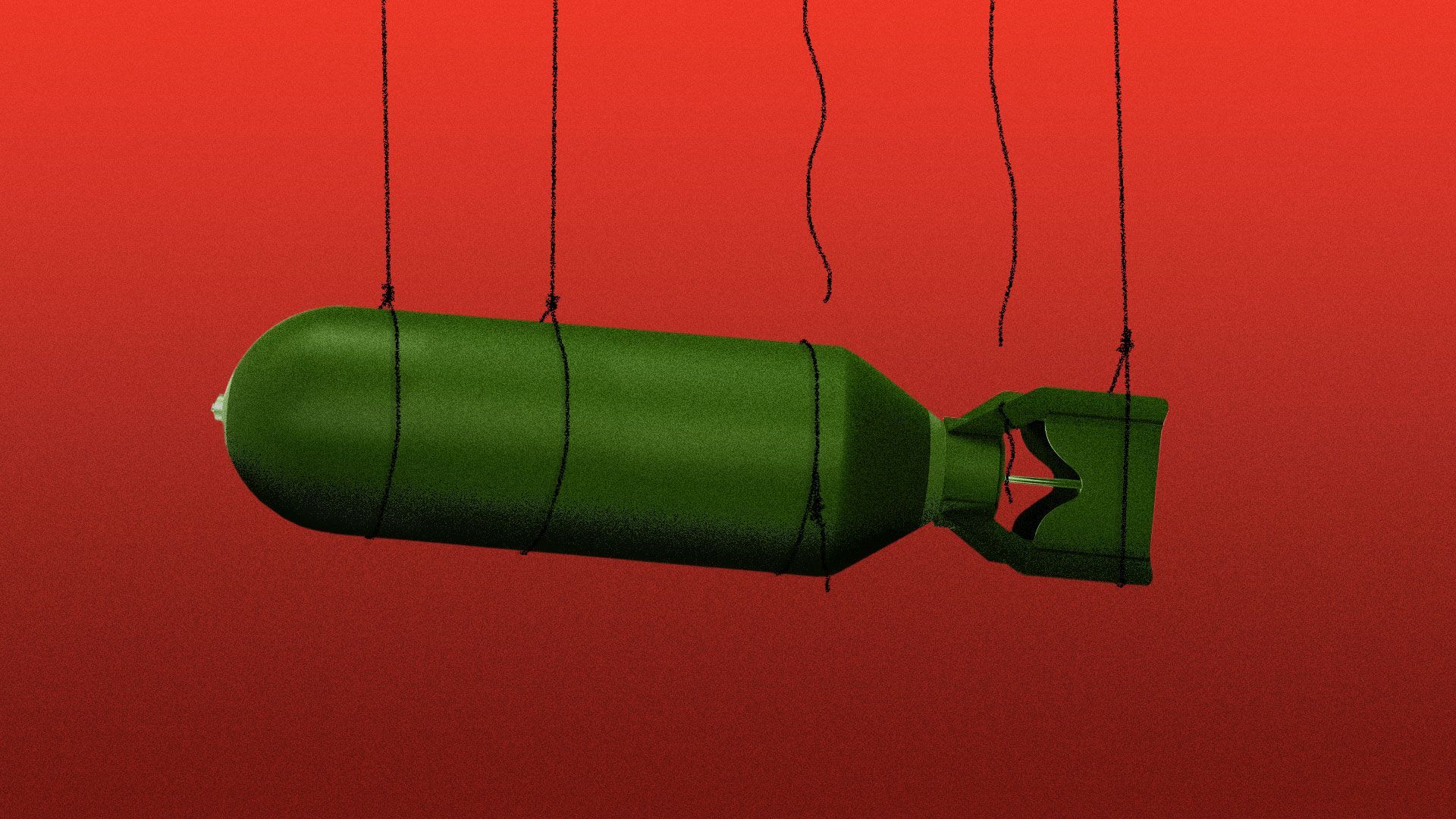 |
|
| Illustration: Aïda Amer/Axios |
| |
| Russian President Vladimir Putin says Russia will move tactical nuclear weapons to Belarus, and will complete construction on a facility to store them by July 1. - Putin said that was no different than the U.S. basing nuclear weapons on allied territory in Europe. NATO called the move "dangerous" and Putin's explanation "misleading."
Why it matters: Belarus is Ukraine's northern neighbor and was used as the launch point for the failed Kyiv offensive last year. - As with Putin's repeated threats to use a nuclear weapon in Ukraine, it's hard to distinguish rhetoric from reality. The White House says it's seen no steps yet from Putin to actually move any nukes.
In other news... India's air force says Russia is set to miss an unspecified "major delivery" this year due to the war in Ukraine. - The war is likely to weaken Russia's already shrinking share of global weapons exports. India is Russia's top customer, and Russia is India's top supplier.
|
    |
| |
| |
| 5. Lebanon's two time zones |
 |
|
| A church tower in Beirut displays a different time than the one decided on by officials in the government palace next door. Photo: Joseph Eid/AFP via Getty Images |
| |
| The basic question of what time it is right now in Lebanon depends on whom you ask, and perhaps whether they are Christian or Muslim. How it happened: The government announced it was delaying daylight saving time until April 21, apparently to allow Muslims to break their fast an hour earlier during Ramadan. - But the Christian Maronite Church rejected the last-minute change. So did many businesses, the national airline and even some government departments.
- "Now I drop my kids to school at 8 am but arrive to my work 42 km away at 7:30 am and then I leave work at 5 pm but I arrive home an hour later at 7 pm!!" tweeted Soha Yazbek, a professor at the American University of Beirut. "I have not gone mad, I just live in Wonderland."
- Prime Minister Najib Mikati is now moving the time change up to Wednesday night.
|
    |
| |
| |
| 6. What I'm listening to: "Next year in Moscow" |
 |
|
| A view of the Kremlin and St. Basil's Cathedral. Photo: Bai Xueqi/Xinhua via Getty Images |
| |
| When Putin invaded Ukraine, much of the Russian intelligentsia fled the country. The Economist's Arkady Ostrovsky was part of that exodus. In "Next Year in Moscow," he tracks down writers, artists, intellectuals and entrepreneurs who've resettled in cities like Istanbul, Tbilisi and London. - They discuss the state of their country and look back on the recent past. Was it naive to have believed the future belonged to people like them? Can anything they do now change... anything?
- It's extremely well done, but if you happen to listen to podcasts while running, like I do, maybe skip this one. It's pretty dispiriting...
|
    |
| |
| |
| 7. Stories we're watching |
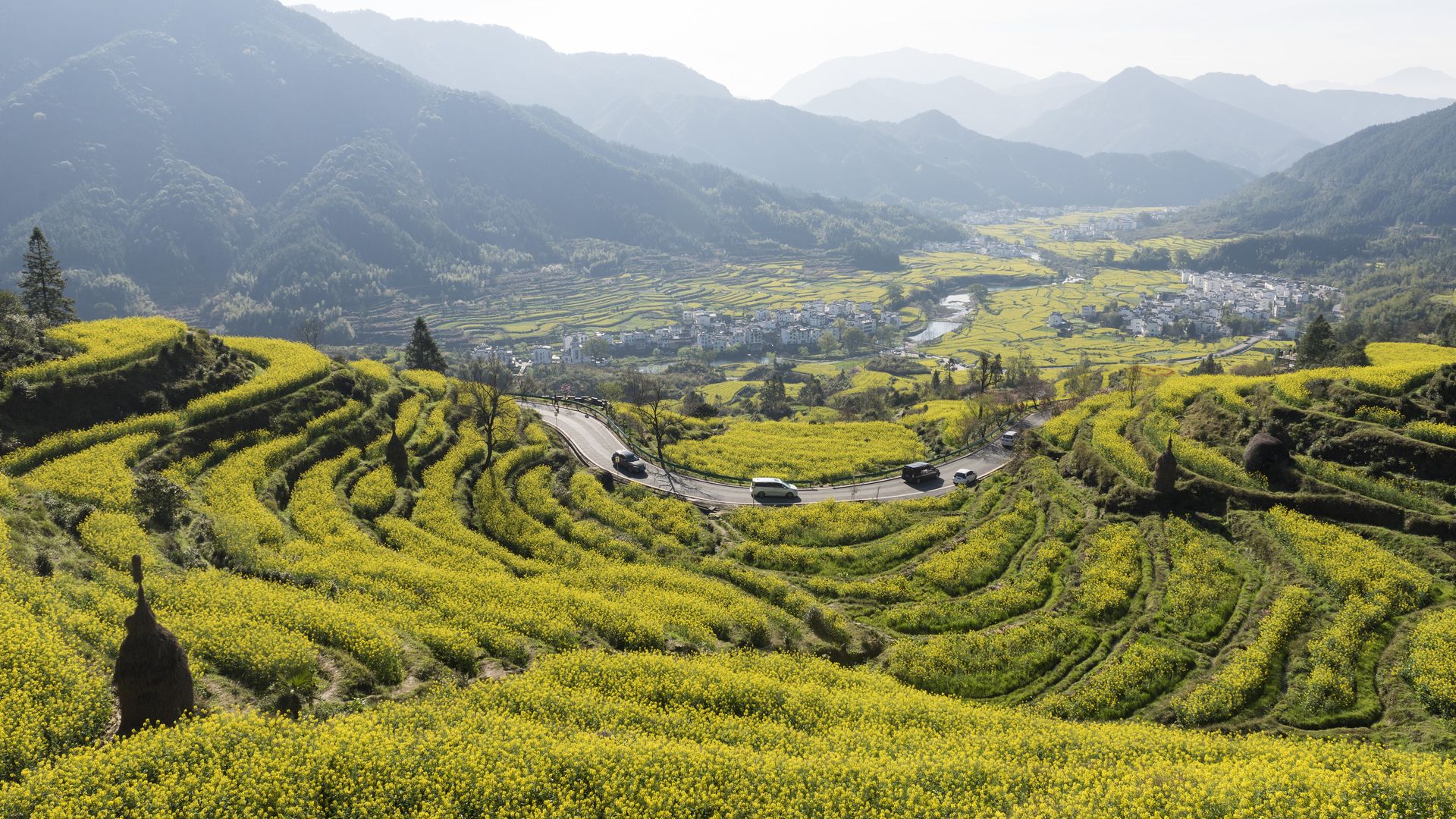 |
|
| Terraced fields of golden flowers in Shangrao, China. Photo; Hu Dunhuang/VCG via Getty Images |
| |
- Tiny island nation takes climate change to The Hague
- U.S. conducts strikes in Syria after contractor killed
- U.S. and Canada strike deal to divert asylum-seekers
- Americans hooked on Chinese apps; TikTok and espionage
- World Bank expects slow growth; Deutsche Bank under pressure
- UN report: Ukrainian and Russian POWs faced torture, executions
- Hungary wouldn't arrest Putin despite ICC warrant,
Quoted: "Can we take a moment to acknowledge that there are currently British Asians as Prime Minister, Scottish First Minister and Mayor of London? Representatives from three different parties. This would have been inconceivable a generation ago." — Humza Yousaf, the son of Pakistani immigrants, was elected leader of the ruling Scottish National Party today. London Mayor Sadiq Khan is also from a British Pakistani family, while Prime Minister Rishi Sunak is of Indian descent (as is Irish PM Leo Varadkar) |
    |
| |
| |
| A message from RENEWAL BY ANDERSON |
| 6 reasons it might be time for new windows |
| |
 |
| |
| New windows can help make your home… - More energy efficient.
- More comfortable.
- Safer.
- Quieter.
- Look better.
- Worth more.
Not sure where to start? For a limited time, buy one, get one 40% off (minimum purchase required) from the top-rated Renewal by Andersen. Request a FREE consultation. |
| |
| Answers: 1. Istanbul; 2. Mumbai; 3. St. Petersburg; 4. Ho Chi Minh City; 5. Tokyo; 6. Beijing; 7. Kinshasa; 8. Toronto; 9. Oslo; 10. Mexico City Key: 1. Byzantium; 2. Bombay; 3. Leningrad; 4. Saigon; 5. Edo; 6. Peking; 7. Leopoldville; 8. York; 9. Kristiana; 10. Tenochtitlán |
 | | Are you a fan of this email format? Your essential communications — to staff, clients and other stakeholders — can have the same style. Axios HQ, a powerful platform, will help you do it. | | |












No comments:
Post a Comment